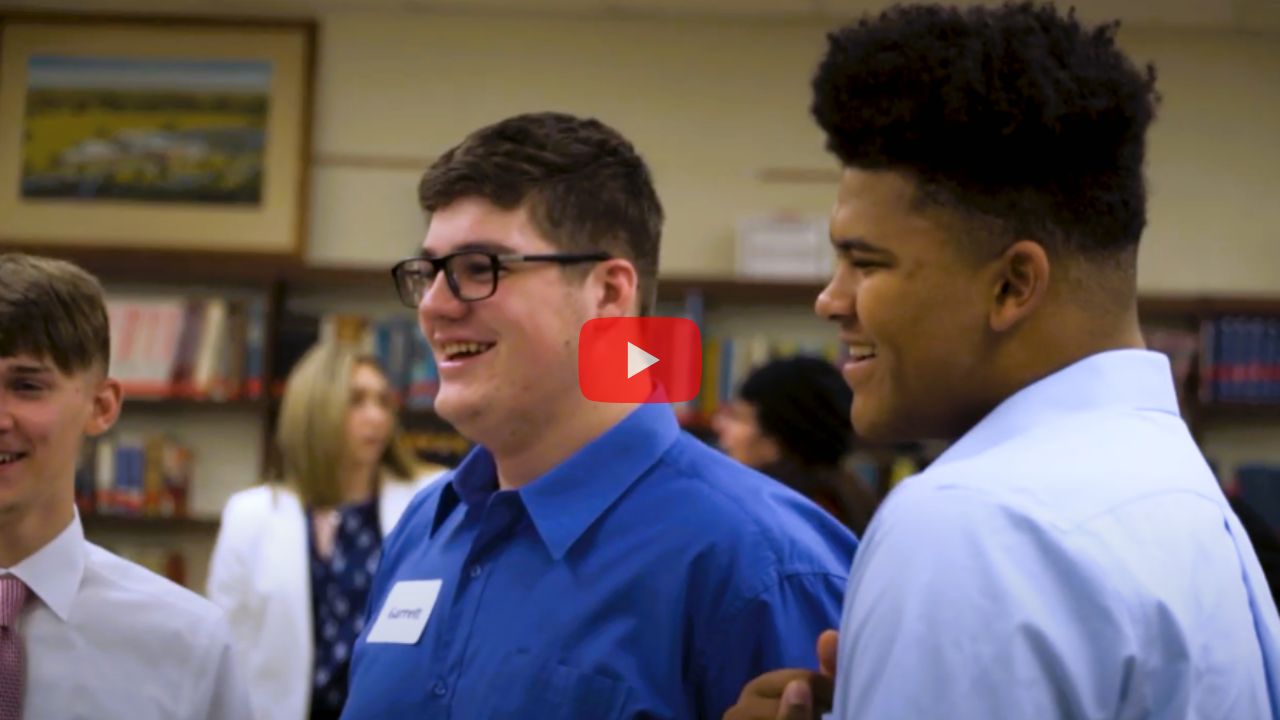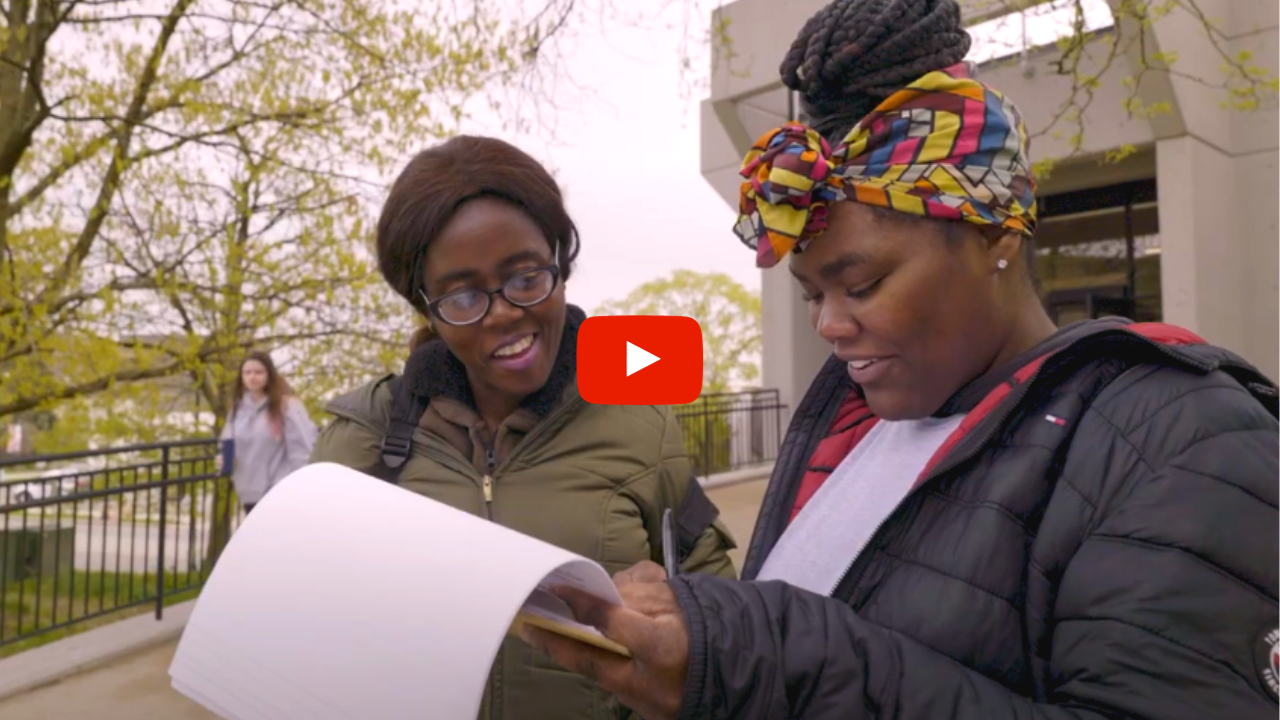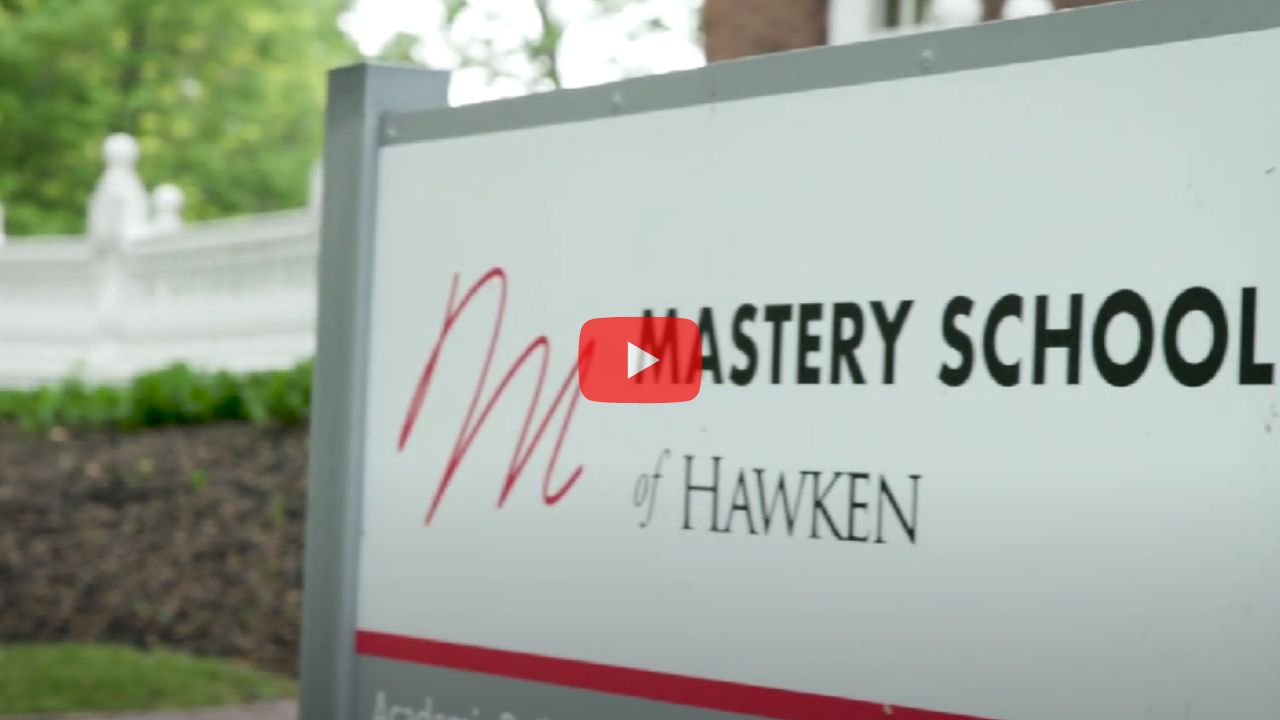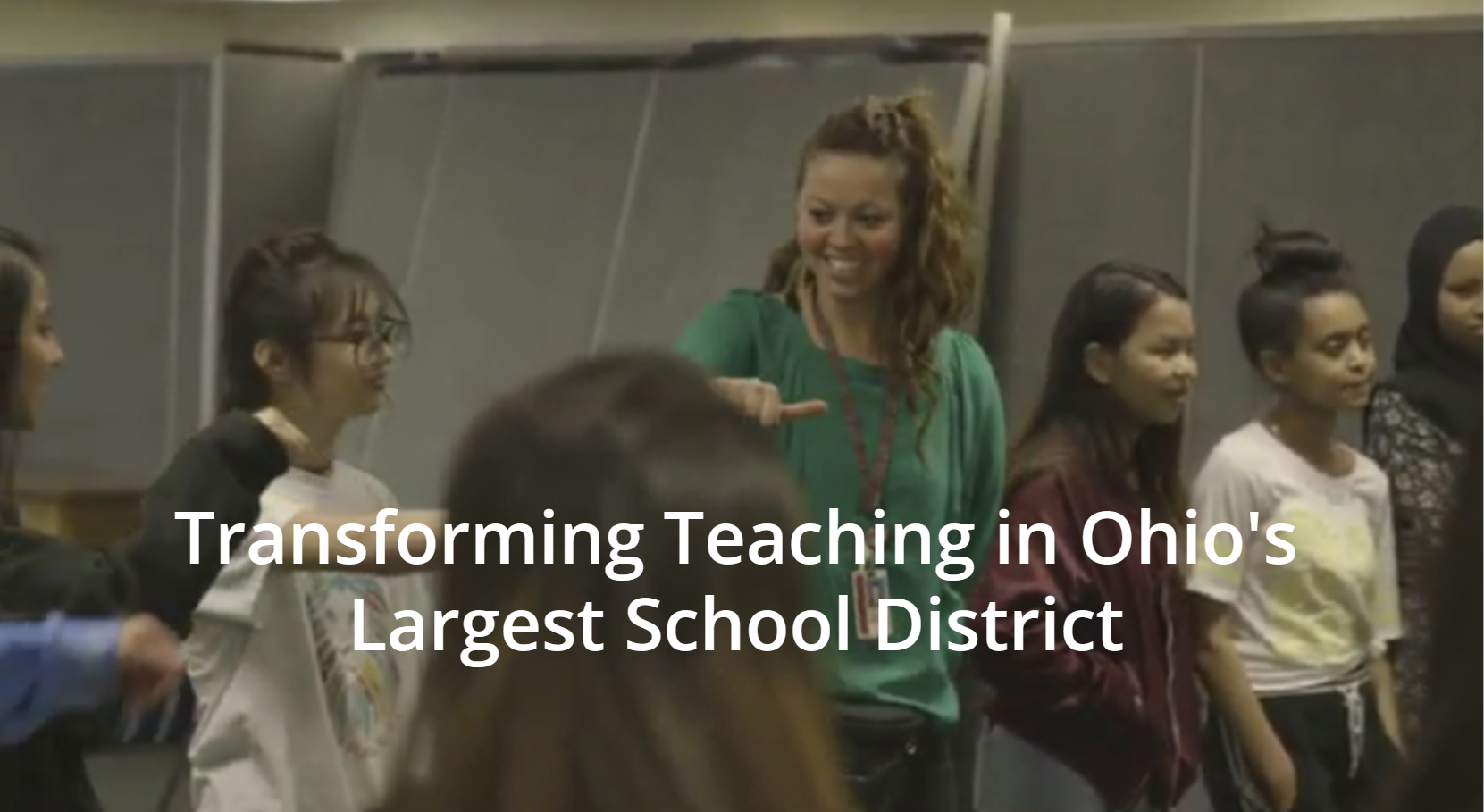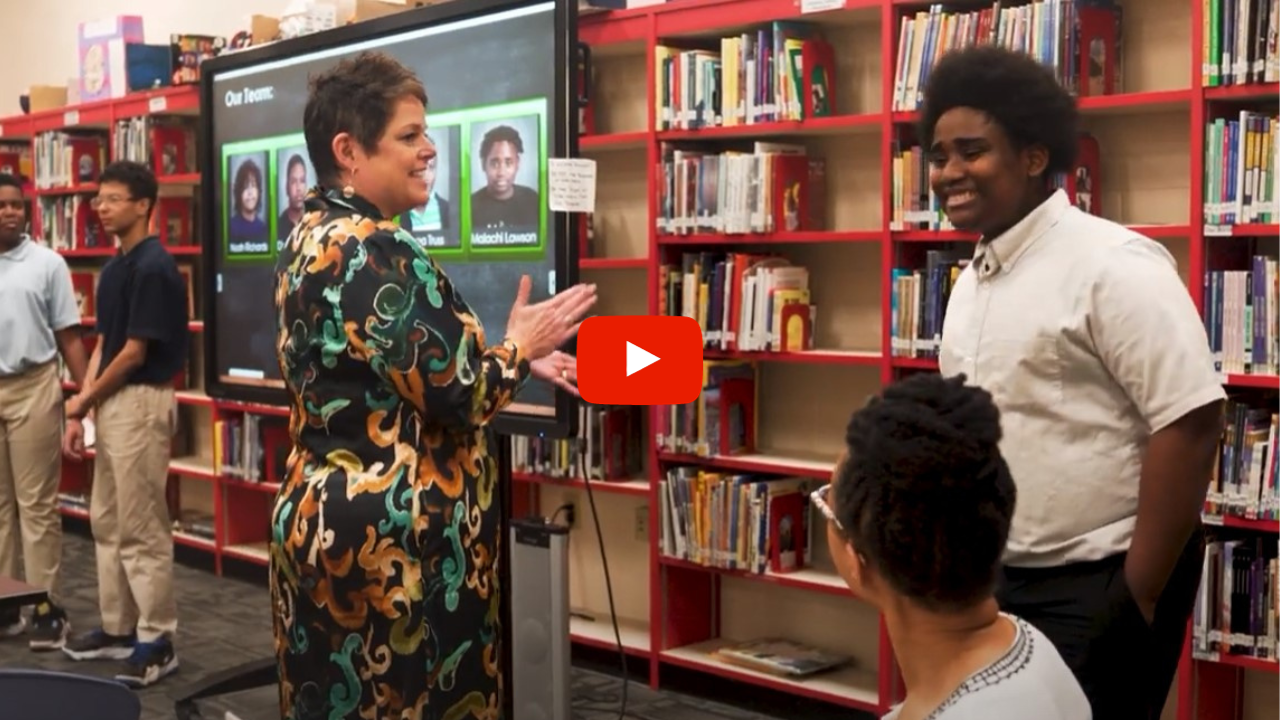In this episode, Doris speaks with Sarah Jensen, High School Entrepreneurship Teacher at Nichols School. Sarah brings an extensive business background to the classroom and discusses the value of students developing the skills they’ll need when they enter the workforce. Sarah and Doris discuss the realities behind the trendy but misleading notion of learning through failure.
Do School Better: A Podcast for People Who Want to Transform Education - Listen to more episodes here
Doris: Hello, Sarah.
Sarah: Doris, hi. How are you?
Doris: Oh, I am so great. How are you?
Sarah: I’m great.
Doris: So Sarah, could you tell our listeners a little bit about yourself and your background and how you came into this?
Sarah: Sure. It’s somewhat a joke in my family. I come from a family of educators and I think if we had a family vote I would have been voted least likely to be a teacher. So it’s my third or fourth career, but I’m loving it. I came to Nichols through a circuitous route I guess. I started…I was in international relations, an econ major at Brown and I wanted to work globally. So I went to work for AIG, American International Group in New York City. AIG was truly global and I walked in there knowing nothing about insurance not even my own insurance and had an incredible opportunity to use skills that I had. Not so much the knowledge I had, but the skills I had to then learn the knowledge I needed to thrive there. I started on the domestic side working underwriting insurance for U.S. banks and then I was able to switch over and eventually lead the financial institutions group globally.
Doris: Wow, wow. That’s a big job.
Sarah: It was. It was fantastic. But you’re 20 something, you’re traveling around the world, meeting with Fortune 500 companies, meeting with large companies, developing new products, taking U.S. products and tweaking them for local markets, starting to work with a team of people that you’ve never met from different cultures all around the world. It was before the days of Skype and cell phones. So you’d get calls at home at all kinds of hours. While I was there. I had an opportunity to do an executive MBA at NYU, at the Stern School which was for me perfect because it was this intersection between what I was learning in the classroom and then being able to go and apply it immediately in my job. So I was going school full time which is basically all day on the weekends and working full time.
Doris: Wow.
Sarah: And so, for me, a light bulb went off that it wasn’t schools over here and work is over here, but there’s overlap and constant intersection was fantastic. So I did…
Doris: Yeah. I went…just to interrupt for a second, that so resonates with me. I went and got a masters as an old lady, older than you and it was such a powerful and different experience than undergrad when I’d been in school my whole life and had no context.
Sarah: Exactly, exactly. And you’re there to learn new skills, to learn some content and to apply it and the grades were not the focus.
Doris: Yeah. Exactly.
Sarah: Then I switched to CNA which is an insurance company based in Chicago and I develop some products. We tried to launch there international operations, ended up in San Francisco and had my first child and decided that I was going to start my own business. So I became an entrepreneur out of necessity which is what I think most entrepreneurs, successful entrepreneurs that’s the way they start. You see a need that’s not being met and you develop a company. So I started a company called Get Settled which was for trailing spouses and families of corporate relocations for all the things that the realtor didn’t tell you.
So I focused on that and I loved it, and I made so many mistakes. I did things absolutely backwards. Having been successful in the corporate world, having an MBA, all of these different things, I did what I knew and I still laugh about it with my students. I’m like, “You want to see failure? Here you go guys. That’s how it was.” It was successful to a point, but it got to the point where scaling it didn’t make sense. So we’re in New York then we went to San Francisco and then to Boston and again it was like, “get out of your comfort zone, use your skills on things that…” where you didn’t have the knowledge, but you had the skills to be successful and to contribute. And we moved to Buffalo for my husband’s job, another corporate relo.
My kids are at Nichols School which is 5th grade through 12th grade and we are thrilled to be there. And as I was sort of unpacking and again had severed everything that I’ve been involved in for over a decade in Massachusetts, I was looking around trying to find when my kids are fairly well settled what was I going to do? And this opportunity came to me through the head of school who saw it. I don’t know what he saw, but I think he saw passion and energy and commitment in a different perspective and said, “We’re looking at launching some pilots, would you be interested in teaching part time?” And I sort of looked behind me and I thought, “Who are you talking to? Me? I’m a corporate person.” And that’s actually how we met you, Doris when we came to Cleveland and after coming and seeing the Hawken Program in action. I was like, “Oh, yes. This is right up my alley. I would love to take on this challenge.” That’s where it began.
Doris: Yeah. And then you came to the Boston workshop that year.
Sarah: Yes. And I love that because many of the people who were in there had either been working on their projects, their launches for some time or maybe they had already piloted program or they were thinking about doing it, you know, the following year. And I showed up and said, “Oh, no, no. This is June. I’m a brand new teacher in a brand new city in a brand new school and we’re launching it in September.”
Doris: Yeah, exactly.
Sarah: And it was phenomenal. It was, you know, I without the workshop I know I would have put together a program. Because I would have tapped whatever resources and created something. But I know that it would have been much more traditional tied back to what I learned in my MBA when I graduated in 1997 and relying on my, you know, what I knew versus having the opportunity you have, you brought this incredible combination of an experience in education and on the business side plus you had piloted it.
And I have to say the “Oh, my gosh, I have Doris’ cellphone. I can call at any time.” Because it’s incredible when you’re doing this by yourself in a school where there aren’t peers who have piloted something similar to be able to reach out across the network and to those who have done it and who are doing it and share. And I am communicating with members of the workshop that I was in and then others that I have connected through the podcast or through your website. So it’s really fun to share and to get new ideas as part of this community.
So basically, I looked at it as I think year one, as a framework I relied on fairly heavily and then increasingly have taken and tweaked for what works best for Nichols and what works best for Buffalo, and honestly what works best based on my skill set.
Doris: Well, I think what you’re bringing up is really important and we’re not talking about just, “Let’s do a project and see what happens and do some presentations.” You have to have really developed methods, curriculum, teaching practice, all that stuff. We’re talking about developing a completely different methodology for teaching in school and all the things you talked about are essential. It’s essential that we have this growing network of educators like you who are not only taking on the pioneer role and braving it, but are helping each other as they go and it’s essential.
Sarah: Yes.
Doris: So Sarah, can you describe the basic structure of the class?
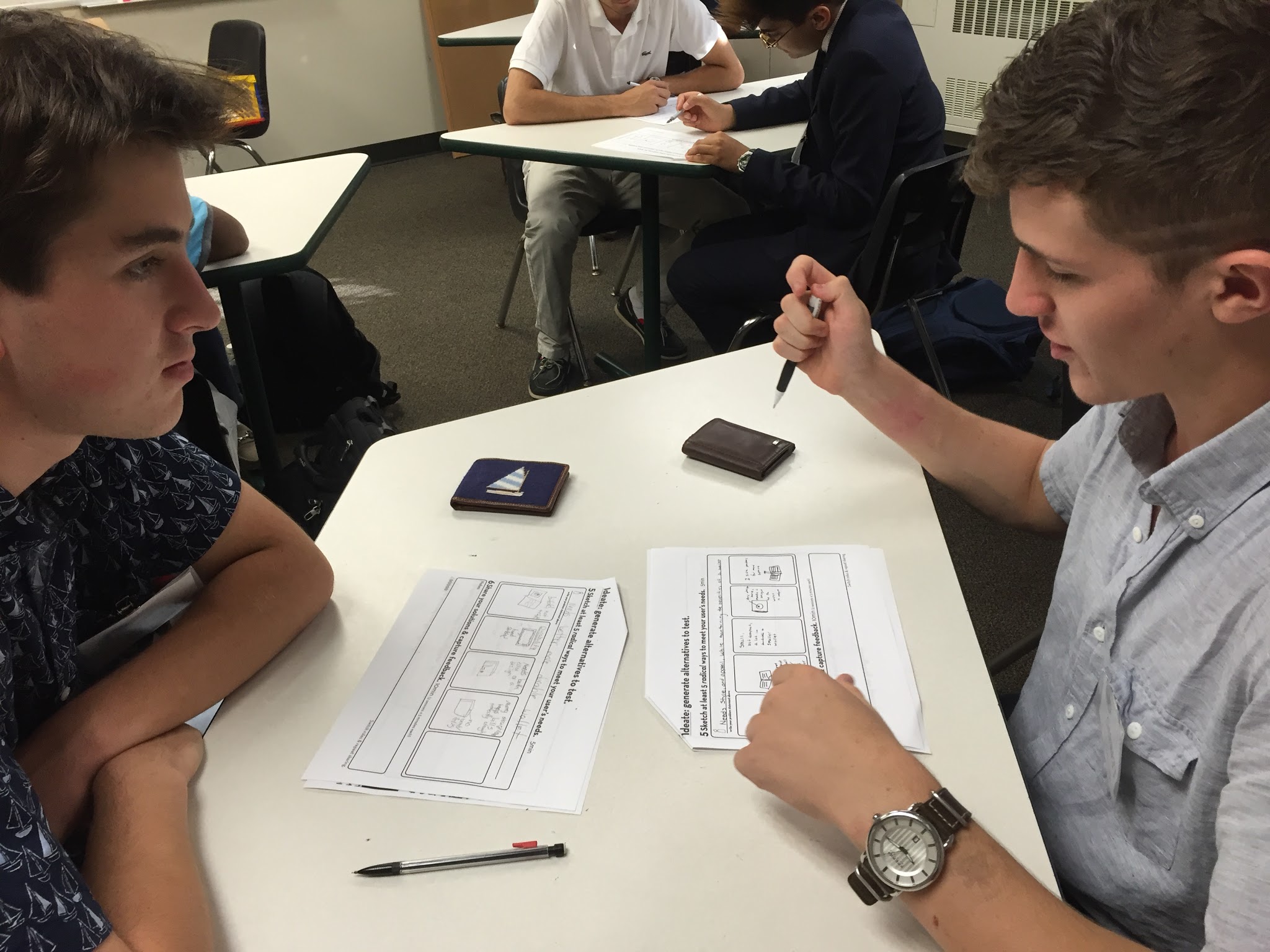
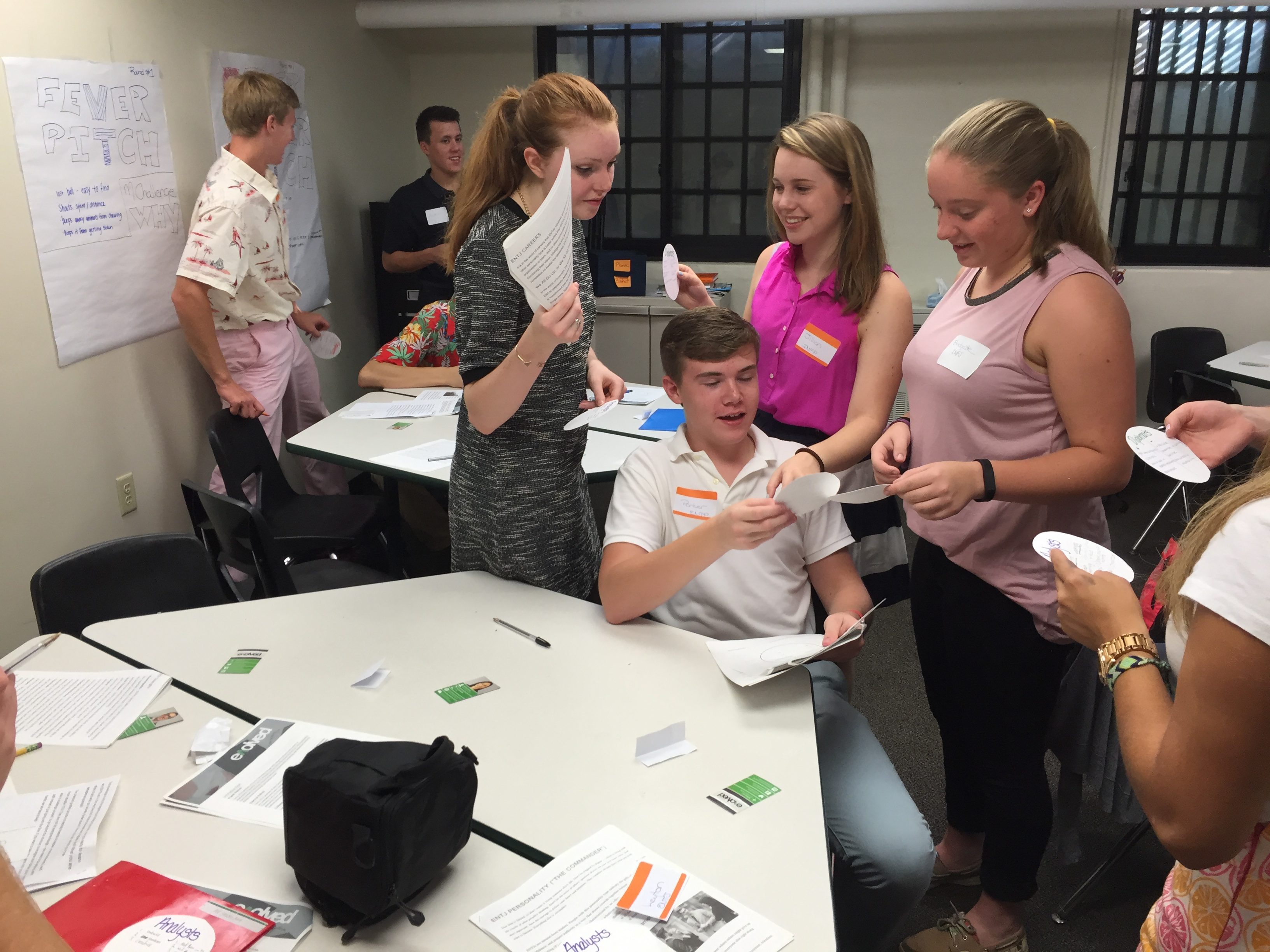
Sarah: Sure, I’m happy to. We initially focus on personalities and teamwork and what that means to work in a team. Because most of the students have never been in a class where 90% of the work is done in teams. And we quickly connect with our first CEO, we work with three CEOs in the fall and then in the winter when they come back from break, the students make their own teams and they work on their own start up ideas and we have a Shark Tank style pitch night which is downtown in the Buffalo Innovation Center called Dig with judges and about 120 guests where they pitch their own ideas and that happens right before March break. And we have debriefed them in between each of those and then when they come back from break, we do it two small challenges, one with a not for profit and one that has a global citizenship component. And then their final if you will is to write something that takes this class which isn’t very obvious, it’s not like calculus. Okay. You took BC calculus, everyone knows what that is. But it looks to try and articulate the skills that they’ve learned in the class into a new setting. So for example, as a cover letter for an internship or to write to a professor in an oversubscribed class or upper level class to convince them that they have the skills and the experience that they need to be in that class. And that’s how the year ends.
Doris: That’s fantastic. And this is a senior elective and it’s one of say, five classes a senior will take in the year?
Sarah: Yes, they take six classes and they also have a senior thesis running at the same time.
Doris: Perfect. That’s amazing. So coming out of that year long experience, what do you see that these students…what’s the growth? What’s your take away about what the students get? And given your background, what’s exciting to me is that you’re able to put into the context of the workplace. What these students get out of this academic class in school that you think they carry with them into the next chapters of their life? What have you seen in the growth in these students?
Sarah: How much time do we have? No.
Doris: Yeah.
Sarah: I am so thrilled and proud of these students. It’s incredible. One of the students this year, he looked at his feet and truly broke out in the sweat every time standing up in front even just in front his fellow students and swayed back and forth. He looked like he was, you know, in the middle of the ocean. He was so uncomfortable. He had great ideas, but could not present. We presented and practice and did the Superman pose and, you know, and all of these different things. And to watch him at the end of the year stand up, lead his team, answer questions with confidence and humor. And he wrote to me at the end and he just said, you know, “I had these ideas and I lost confidence in my ideas because I couldn’t communicate them. Now, I feel that I can tackle anything.”
Doris: Wow.
Sarah: And I think when I first got in AGI again, I knew nothing about insurance. But I watched people who had experience and masters degrees and they couldn’t speak up at a meeting or a presentation. And I had done a tremendous amount of public speaking or I didn’t know it was tremendous amount at the time. At the school I went to we had no choice, we had to do speeches every single year. So it wasn’t my favorite thing, but I had a skill set that allowed me to get on planes and fly all over the world because I could learn the content, I had the skill. And I think for the students it’s the same thing. Their understanding that they don’t have to have perfected it and none of us have, we continue to learn forever. But to understand that repetition and effort and not being afraid of failing is just gonna stop them on trajectory to do anything they want to do. So I also think another…if I could share another story.
Doris: Yeah. I’d love to. Yeah.
Sarah: So just some more context. My class is not an honors class, it’s not an AP class and it’s an elective. And it’s everything from students who are dying to take it to students, it’s about the only class that fits into their schedule. So I have a real range of students. Someone who study business, some have no idea, some are going into the sciences, you know, real range and some of them come in and they’re I would say the eagles. They have done incredibly well at school by themselves and they have an absolute death grip on their teams. They are up at 3:00 in the morning changing the slides, trying to control everything. I worked hard with those students to talk about what it means to be a leader and to look at different types of leadership. And I received this incredible again, handwritten thank you note from one of my students who’s headed off to Columbia next year who is this type of student, one of the top students.
Just how much he learned about himself and about teams and about how to bring out the best in people and how to step back, and it just was fascinating and exciting to me. Because we have been talking about it, but more one-on-one not so much as groups. And I realized that each of the students are really on their own pack, one had no confidence in presenting another had no confidence in following. And throughout the year, there are so many challenges that the kids have an opportunity to really focus on and skills that will serve them incredibly well in the business world or whatever world they choose to go into because it is about teamwork.
Doris: And you may remember from…one of the stories you said reminded me, you may remember from the workshop I talked about this thing called, “Deschooling” and it’s consistent that when you do a class using these methods in school for credit that they come into the class and they’re used to regular school, it’s transactional, teacher says, “Here’s what I need you to do,” student does it, teacher gives back grade, they come in and that’s what they’re ready for. And this thing you’re doing is totally a mindset paradigm, crazy, disruptive, radical shift for the students. And the kid you described who you said didn’t have the confidence to follow, you know, what I’ve seen with those kids, it’s not their fault, we’ve trained to these kids to operate like this is they have a very one dimensional and actually not helpful understanding of what leadership means.
Sarah: Yes, I couldn’t agree with you more. I think oftentimes they think it’s the first one to the answer, not the best answer or the loudest or the one who pushes the most. I have had several introverts in the class who have incredible insights and talents that have worked very hard to try and find a voice. And they were so used to just sort of doing their own thing because they didn’t think others would listen, it wasn’t worth it. And I think one of the things about doing presentations weekly and I bring in somebody other than myself for every single presentation every single week we catch up.
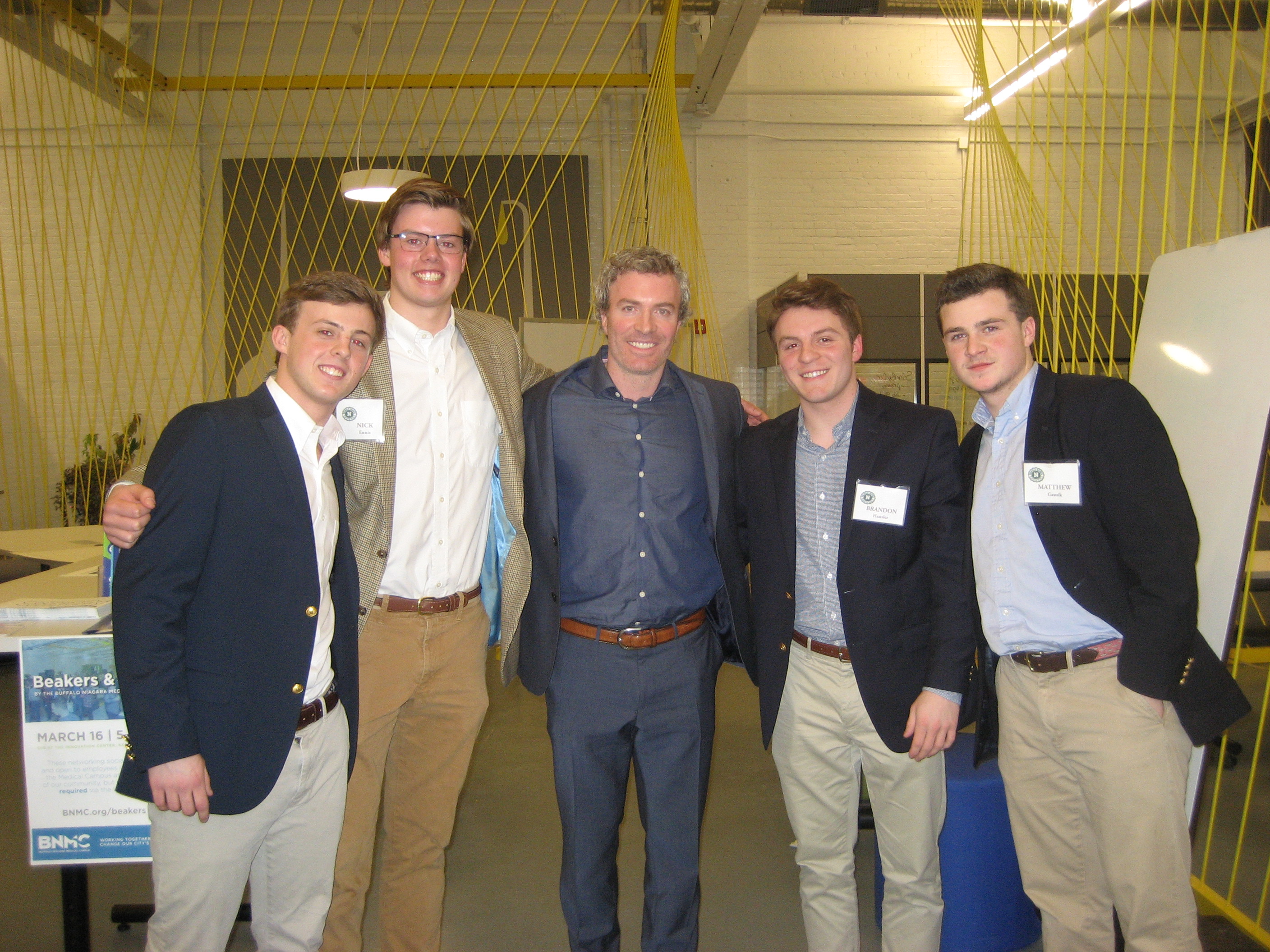
Doris: That’s fantastic.
Sarah: And each of those individual has a different career path and a different personality. So I think the students have this opportunity to not only hear what I think in my perspective, but they hear from their peers and they also hear from this authentic audience on a small scale and then on a large scale. And because we do it again and again and again maybe 35, 40 times in the course of a year, there’s a reason to keep trying I think. And so many of the classrooms they have presentation day. If it goes well, “Great.” If it didn’t go well, “Oh, well.” But we go back at it, we deconstruct, we video tape, we watch, we laughed, we have a bloopers reel at the end of the year where the kids say, “Oh, my gosh. Can you pull up that one? Do you remember…” They’re fully invested in this.
Doris: Well, they’re fully invested in this and what you’re describing is the learning process, you know. The learning process requires that you have lots and lots and lots of goes at trying something then reflecting back on it and then revising, trying again. You know, it’s very hip now to talk about fail fast, fail often, you know, the whole fail word. But the reality of it is really failing at anything that you care about is a horrible experience and as humans we try to avoid it. And what we’re really talking about is, you know, to develop these skills, we talk about resilience and the habit of revision and all these things. You have to have experience that you try something and it doesn’t go so well which we call failure and then you get to do it again. And what this kind of class that you’re teaching gives these kids is that opportunity to learn, to really do the kinds of repetitive things that will allow them to in an academic way, I think of it as academics focus on the development of these skills that we talk about, students needing in the world.
But we’re not set up in school to teach these skills and that’s what you’re doing, you’re teaching skills they don’t otherwise have. And I love the way you said even in describing your own career path that you learned how one of the skills that you developed is the ability to learn really hard content that you don’t know. That’s part of what these students learn as well. And I love to hear you talk about how the part of the curriculum that is the teamwork and collaborative skills. Talk a little more about what that does for students and give us some examples there as well. That’s a messy thing as a teacher to set up a class in a high school where they’re entirely working on teams.
Sarah: Absolutely. So we work with…we do 16personalities.com. It’s free, it’s a Myers Briggs shortened version. The kids love it because they go through, they answer the questions, but then the results that come out say, “I’m a diplomat. I’m an entrepreneur. I’m a campaigner.” Whatever it is and then they have all of this information at the bottom. And they go through and they say, “Oh, yeah, that applies to me, that doesn’t.” And they start to think about what their skill set is, what they bring to the table. And then I create the teams and then I very much take my hands off. And I have a sheet that I give to parents on parents’ night which is a parent’s guide to ESE and I say, “If your kids come home frustrated, uncertain with angst and friction, that’s good.” Right?
Doris: Yeah.
Sarah: Send them back to their peers. If their team can’t figure it out, they will collectively come find me. I will not come find them. If they’re really miserable over a long period of time, encourage them to come talk to me. But when they walk in the door and say, “Oh, my gosh. I don’t understand any of this. I don’t understand these people, there’s no roadmap, there’s no rules.” That’s exactly what it is and they cannot succeed as individuals and they quickly figured that out and they figure out how to distribute the work and they also figure out how to leverage the skill sets. And I would say that the other side of the student that maybe is the eagle, I have students who have done well at Nichols, but have not loved the traditional school setting. They get into my classroom where it’s real and concrete and fast moving and they thrive. They draw on their own work experience.
So I’ll give you an example. Last year we worked with a landscaper who has to layoff half of his employees over the winter because there’s not enough work plowing. He had developed, he has an idea for a garden box and he created a prototype and we had to decide whether or not to launch this. And if we did he’d redeploy his employees from plowing and landscaping into a small production facility to make these garden boxes and to sell them.
Doris: Wow.
Sarah: So you need to tell him. Does he laid these people off on December 1st or does he launch this? Does he double down or does he, you know, cut his losses? And one of the students whose father runs a paving business every summer is out there as a foreman and involved. He knows firsthand how difficult it is to retrain employees and to lose employees who are working so well every year in the seasonal business. He worked incredibly hard. This was a kid who didn’t necessarily get into the details of things. He worked incredibly hard to try and figure this out, but he also realized that he had to be realistic. But he couldn’t go to the CEO and say, “Joseph, keep all 10 guys.” In their model and he really led his team. For the first time they said, “No. We think you can to this with five guys. So we suggest that you layoff five and that you keep five and this is how and this is why.”
Doris: And did you feel as somebody who’s got the depth that you have that they’d done their homework, they had the details behind that to show?
Sarah: Absolutely. By comparison to some of the other teams who were like, “Oh, great. Put it on Amazon, put it at Lowes, put it at Home Depot.” You know, in three months here you go. The practical aspects, the life skills or the life experience translating with this new set of skills made this students who wasn’t a leader, wasn’t one of the strongest academically, a leader in his team. And then everyone else who have sort of been like, “Whoa, what? How?” You know, just came around to say, “He really has a lot to contribute.” And the balance of the teams moving forward after that, the more experience they had with one another the more sort of they weren’t equal in skill set, but they were…they had different skills and they were more equal in ability and they started to work together much more effectively. And the teams when they created their own teams, they want teams of friends.
Doris: Yeah. Because they knew what they needed and they learned a lot by then. So Sarah, you’ve come…your product of some of the most prestigious educational institutions in the world and you had a successful business career. What do you say to somebody who says, “Well, that’s nice that you have this entrepreneurship elective at this private school. It’s not really academic, does this really belong in a high school academic program?” What would you say to that?
Sarah: Well, my first answer is absolutely. I explain at the beginning this is not a mini MBA. I am not…yes, they will learn cutting edge, best practices methodologies, etc. But I would say that I focus very much on creativity, critical thinking, collaboration, communication, citizenship and failing. And there’s so much that in so many different directions to go with these students, but I anchor it there and I used the Lean Startup and we rely heavily on the Business Model Canvas and we work with the framework, the Korda model of the engaged early with an authentic start up and authentic audience.
I think with the students, the more that we can get them off campus, the more we can get individuals who aren’t faculty members in the classroom to give them feedback. The kids soak it up, they absolutely love it. But I say absolutely because it is…I use the Venn diagram with the two circles with the overlap and I absolutely believe in the intersection of knowledge and skills. And I think in this world, I have two kids who are students at Nichols so I’m very much looking as a parent as well, I look at them and I say, “The information is there. The question is do you know what to do with it?” And I think a big part of it is to be comfortable in knowing what you know, knowing what you don’t know, teaming up with people who have complementary skills and having quite frankly the guts and the ambition.
I think that it’s great to be in a more structured setting, but the exciting opportunities are not coming there. And I think of a student who has the confidence and the skill set to feel that any path that they want to pursue is a viable option then that is tremendous. Because then they will go and pick their college courses, their graduate studies, whatever it is that they want to pursue from there with that lens of, “These are just more tools and more skills that are going to add to my path, but I am very capable of designing my own future.” So I love it, I’m excited to have the opportunity to do it and I’m excited with the feedback from the business community. And we probably work with 85 different members of the Buffalo business community each year as well as the students who have come back from college and the young alums that I’ve worked with.
The feedback is, “Wow. That crazy Mrs. Jensen, the thing she was talking about, they were very helpful, they resonated.” When the student gets the feedback, “Yes, you’re in here because of your interpersonal skills has opened a door for you.” I think that that’s tremendous and I don’t think that you can teach that in a traditional setting. I think you have to setup and scaffold these real world interactions and then take your hands off the wheels and let the kids step up, let them struggle, let them fail, let them regroup, let them work together and the confidence that comes out of that I think is incredibly valuable, but I’m a little biased I guess.
Doris: Well, I think that’s a great place to end it because that’s exactly the point and you have taken on by teaching a radically different class inside of a school. You’ve taken on a huge challenge and you’re succeeding brilliantly. Keep doing what you’re doing, Sarah and I’m just excited for your school and for your students. It’s a pleasure to talk to you.
Sarah: Well, thank you very much. Pleasure to talk to you.


